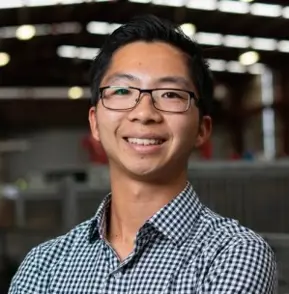What motivated you to join Facteon back in 2014?
Facteon’s role in a global technology group appealed to me as a new grad looking to gain broad experience. I wasn’t looking to specialise early so I sought a role that I felt would allow me to work across different areas of engineering and with different technologies.
Above all, engineering is about problem solving. The opportunity to work alongside manufacturers at different stages of their Industry 4.0 journeys really appealed to me. I was also wanting to travel and (pre-pandemic) I had many opportunities to do so. A highlight was a three-week secondment to China to upskill our in-market engineering teams. It’s been motivating to see that hard work pay dividends. A recent example is our New Zealand designed and China built robotic welding cell (watch it here).
As a founding participant in Facteon’s Cadetship Programme, it’s been great to see how both the programme and manufacturing industry has evolved over the past six years.
In your six years at Facteon, how have you seen the manufacturing industry evolve?
The pace at which the industry is changing is reflected in how our customers approach projects. While manufacturers work to meet their market, Facteon must do the same as our customers rely on us to make their businesses work.
The most significant change I’ve seen is the focus on applying new technology to achieve rapid ROI. As consumer demands are changing more rapidly than before, manufacturers recognise that they must deliver exactly what their customers want. The days of Model T and one size fits most are over. We are nearing the other end of the spectrum in which manufacturers are needing to design, manufacture and deliver exactly what their consumers want faster than ever before.
For that reason, we have seen the intersection of technologies enabling rapid ROI and flexibility. As a result, Facteon has worked to pivot its own approach to project delivery. Through pairing modern engineering techniques with increasingly affordable technologies, such as robotics, manufacturers have a unique opportunity to meet market demand at speed.
Of course, we have seen a surge in demand for Industrial IoT technologies. The ability to make decisions in real-time is becoming increasingly critical to business success. With manufacturers needing to pivot rapidly, live insights into the state of your operations is a foundation of success.
What advice do you offer for the Engineering Class of 2020?
The piece of advice that I would offer to all engineering graduates is that resilience is an invaluable trait. Resilience is often misdefined as an ability to weather any storm. Instead, it is better classed as an ability to adapt and evolve. I have to thank a colleague for that insight. Resilient manufacturers are poised to thrive in both a COVID and a post-COVID world. The same goes for graduates. Stay focused on what you want to achieve. Tap into your networks, both professional and personal, to continue working towards your goals.
By way of more practical advice, speak to people in your field. Ask them how they got to where they are. Above all, back yourself and retain that hunger to thrive as a person and as a professional.


